HOW CAN WE HELP YOU? Call 1-800-TRY-CHOP
In This Section
Our Best Stories of 2021, From Self-Care to Setting New Standards for Pediatric Research

In 2021, our followers engaged with stories about inspiration, off-campus hobbies, and novel approaches to childhood diseases.
limjr [at] mail.chop.edu (By Jillian Rose Lim)title="Email Nancy McCann"
When it comes to new normals and challenging changes, 2020 was hard to beat. But in 2021, we watched the world experience a series of positive “firsts,” from the first wide rollouts of the COVID-19 vaccine to the first time many saw family members in more than a year. Here at Children’s Hospital of Philadelphia Research Institute, our year was marked by discoveries and developments that continued amid the ups and downs. On our Cornerstone blog, we published stories about how our researchers engineered a fine-tuned delivery system for gene therapy, developed antibiotics that can reach resistant bacteria, led a collaborative project of whole genome sequencing for thousands of brain tumor samples, and much more.
As we looked into which of these stories our followers reacted to the most on Twitter, Facebook, and LinkedIn based on engagement data, the stories about self-care, narratives of inspiration, and the promise of new approaches to longstanding pediatric diseases stood out the most. So, as in previous years, we compiled a list of the top stories our social media community loved the most — a community made up of researchers, aspiring scientists, collaborators, fellow institutions, families, and donors — and gathered them here for you to read.
Making Room for Relaxation, From Music to Carpentry
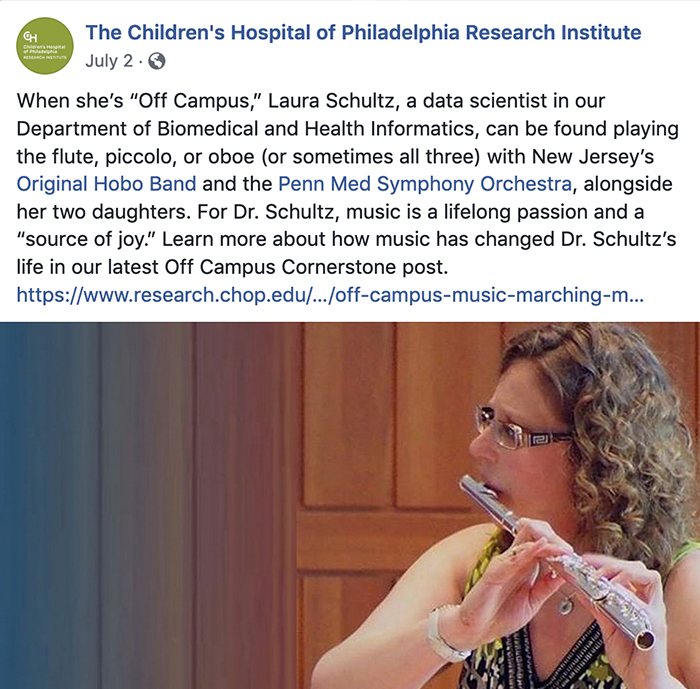
Not surprisingly, two stories from our Off Campus Cornerstone series received the most engagement on Facebook and Twitter. A seasonal summer series, Off Campus shares some of the hobbies, habits, and self-care strategies CHOP investigators and research administration staff turn to when they need to de-stress. On Facebook, readers loved to learn and share how Laura Schultz, PhD, a data scientist in our Department of Biomedical and Health Informatics (DBHi), uses music as a way to connect with her family and community. Dr. Schultz and her daughters are members of the Original Hobo Band, a Pitman New Jersey community of passionate musicians. Dr. Schultz is also a member of the Penn Medicine Symphony Orchestra, having played several virtual performances with the group.
“When I am feeling stressed, playing one of my instruments provides me with a great release,” Dr. Schultz said.
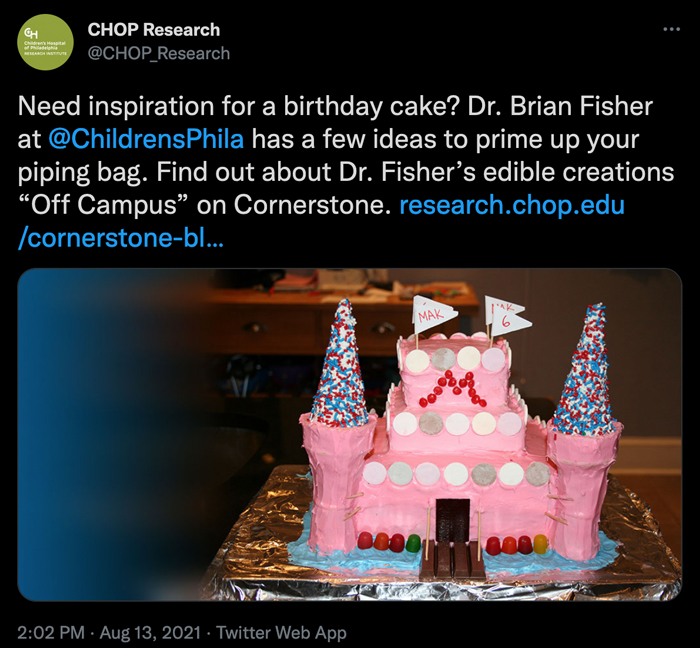
Meanwhile, our Twitter followers engaged with another Off Campus story featuring Brian Fisher, DO, MPH, MSCE, a physician-scientist in the Division of Infectious Diseases at CHOP, and his love for baking and building — from elaborate and creative cakes to woodworking. In the story, Dr. Fisher discusses some of his pandemic creations, including an ice hockey rink in his backyard and a baseball-themed desk with legs made of bats. “As a physician-researcher, you do engage that part of the brain a little bit, because you want to be creative and innovative with studies and grants, but to a certain degree, you still have to work within the confines of what’s doable,” Dr. Fisher said.
Head over to Cornerstone to read our 2021 Off Campus series.
Inspiring Stories From Women in STEM
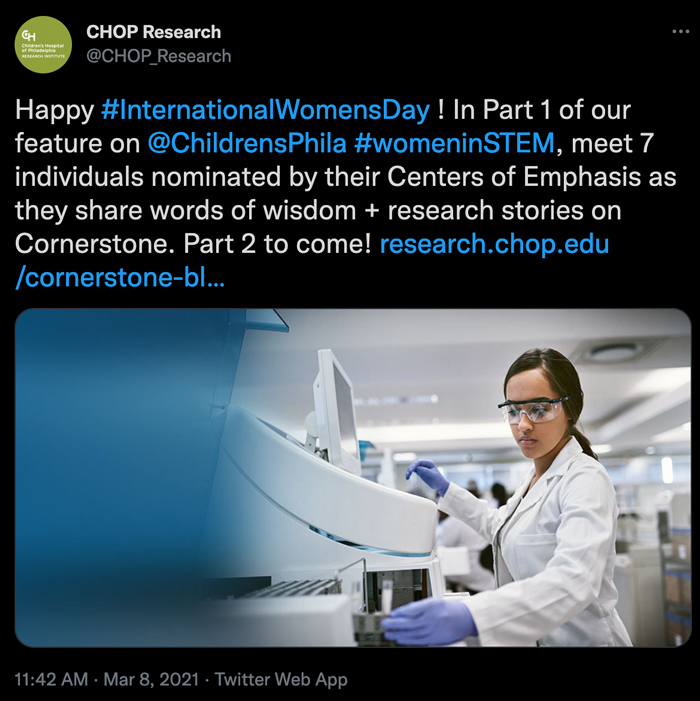
CHOP is home to outstanding role models for women in STEM. To celebrate Women’s History Month this March, we published a two-part series featuring a gallery of individuals who thrive in areas that have been historically underrepresented by women. Nominated by Center of Emphasis leaders, each of these women continues to challenge the status quo in their fields, whether it’s by conducting groundbreaking research or by directing the administrative operations of our Centers to support scientists. This year’s gallery featured a range of individuals who offered their experiences and advice to aspiring women in STEM:
“Figure out what questions you really want to ask, and how these questions could have an impact in the world,” said Nancy Kassam Adams, PhD, associate director of Behavioral Research at CIRP. “It’s really important to love the questions and feel that what you’re doing makes a difference.”
Denise Adams, MD, investigator in the Center for Childhood Cancer Research, said, “Take a moment to stand on a chair in the middle of your kitchen and sing, ‘I am woman hear me roar!’ Teach your daughters to do the same!”
When work overlaps with passion, it’s a privilege, said Heather Burris, MD, MPH, neonatologist: “If we find that sweet spot and follow it through the ups and downs, there will be no regrets.”
Read more inspiring advice by visiting the Women in STEM 2021 gallery on Cornerstone.
Developing New Approaches to High-Risk Cancer
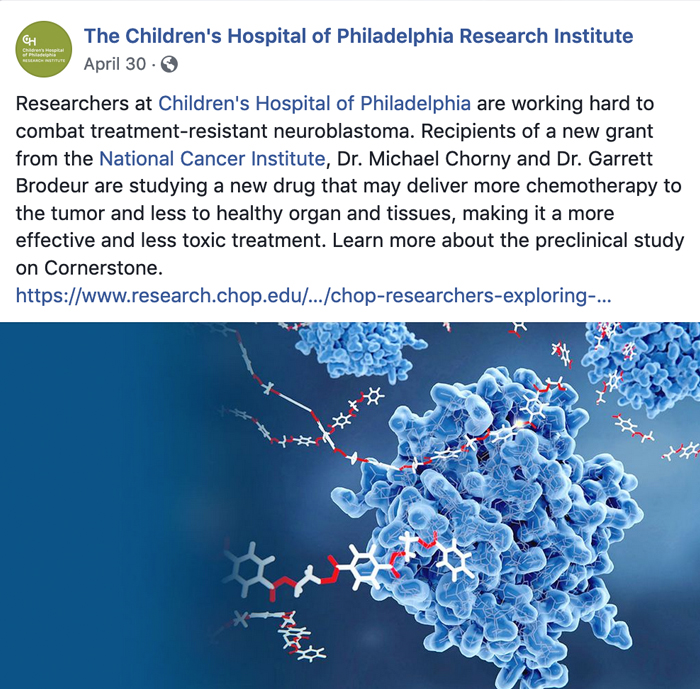
Two novel discoveries regarding neuroblastoma, one of the most aggressive pediatric cancers, topped our list of the most engaging Cornerstone stories of 2021. The first described research supported by the National Cancer Institute and led by Michael Chorny, PhD, CHOP investigator and research associate professor at the University of Pennsylvania, and Garrett Brodeur, MD, Audrey E. Evans Endowed Chair in Pediatric Oncology at CHOP.
In an attempt to develop a more effective and less toxic approach to neuroblastoma, which is often highly resistant to chemotherapy, Drs. Chorny and Brodeur launched a study evaluating a treatment designed to skip over healthy cells and deliver a higher dose of the drug to the tumor. The dual-selective experimental drug delivery strategy targets neuroblastoma in two ways: by modulating tumor accumulation of the drug driven by norepinephrine transporter (NET) and by confining the cell killing effect to rapidly dividing tumor cells.
“Many of the chemotherapeutics used for neuroblastoma have a very low selectivity for tumor cells, and as a result, the therapeutic window is very narrow or may not even exist,” Dr. Chorny said. “In the meantime, the treatment is also killing normal cells and causing strong adverse effects. Thus, we cannot increase the dose, which poses the risk that the disease will be undertreated and might come back in a more aggressive form.”
Read the full story on Cornerstone.
Changing How We Approach Solid Tumor Treatment
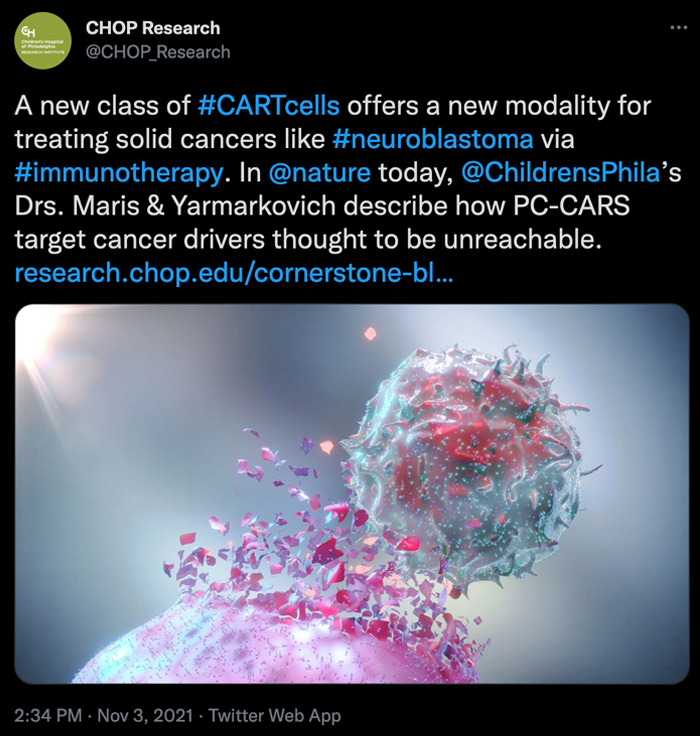
In 2021, cancer researchers at CHOP also introduced a new class of chimeric antigen receptor (CAR) T-cell designed to target solid tumors like neuroblastoma: the peptide-centric CAR (PC-CAR). While scientists have had great success treating leukemia via CAR T-cell based immunotherapy, the majority of solid childhood cancers have proved challenging because the proteins driving these types of cancer often reside deep in cells’ nuclei. To address this, Mark Yarmarkovich, PhD, investigator in the Maris Lab, and John Maris, MD, physician in the Division of Oncology, developed PC-CARS with the ability to recognize and target tumor-specific peptides on the surface of neuroblastoma cells.
“I have watched many neuroblastoma patients die because of a lack of effective therapies, and this research is exciting because it is potentially a new curative drug — and not just for neuroblastoma,” Dr. Maris said. “We’re sold on the power of this approach for other cancers. Clearly, immunotherapy is underutilized for a lot of important reasons, and this approach will obviate some of the main obstacles to its success.”
On Twitter, this story ranked as one of those our followers engaged with and shared the most — and rightfully so!
Discussing Mentorship and mRNA With a Vaccine Expert
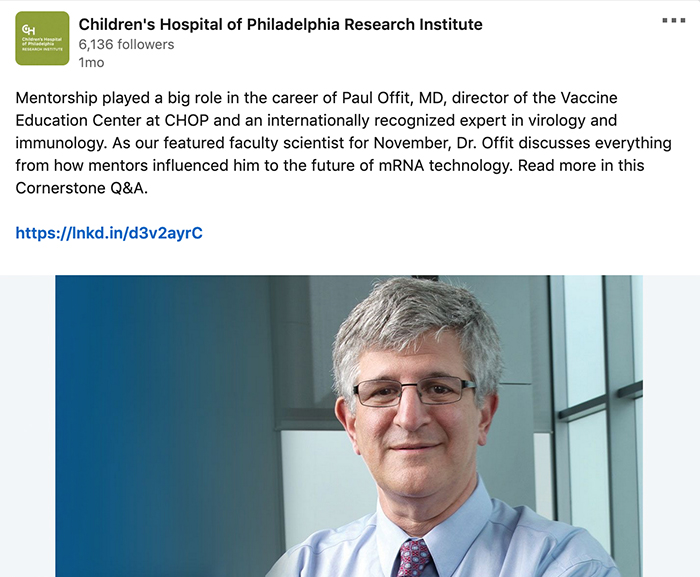
Our social media followers loved our Q&A with Paul Offit, MD, director of the Vaccine Education Center at CHOP and an internationally recognized vaccine expert. The story was our first installment of the monthly Faculty Spotlight series to focus on a senior investigator, with the theme of mentorship.
In his Q&A, Dr. Offit described the influence of several mentors, including the inventor of the rubella vaccine, Stanley Plotkin, MD, throughout his research career. Dr. Offit went on to co-invent a landmark vaccine for the prevention of rotavirus gastroenteritis and continues a decades-long career as a researcher, author, professor, and strident spokesperson for accurate science and vaccine advocacy.
“What a mentor offers are experience and expertise,” Dr. Offit said. “When you’re starting out, you don’t have that, and a good mentor will be able to help, by example or by word, by availing you of that expertise and experience.”
Not one to shy away from tough topics, Dr. Offit also discussed the importance of factual accuracy in the telling of science in his Faculty Spotlight feature.
“In the world of science, there are not two sides to every story; there are scientific truths, and it’s not a matter of balance but rather a matter of perspective,” Dr. Offit said.
The Q&A also touched on what interests Dr. Offit the most about future applications of mRNA technology, and his advice to aspiring young scientists.
Supporting Young Scientists Through CRISSP
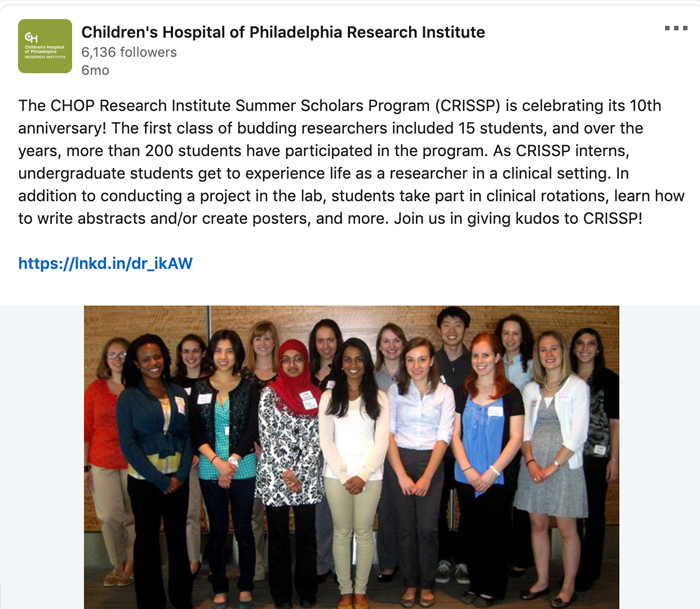
The CHOP Research Institute Summer Scholars Program (CRISSP) celebrated its 10th anniversary in 2021, marking a decade since the program first began accepting undergraduate interns from across the country. CRISSP provides college students with a full-time mentored research experience that includes opportunities in basic, translational, clinical, and behavioral research. More than 200 students have participated in CRISSP, and more than 60 CHOP faculty members have served as mentors.
In this year’s story on CRISSP, we caught up with two former interns from the very first CRISSP class, asking them how the program influenced their next steps and careers. Chitra Mosarla, MD, who will soon start a cardiology fellowship at New York University, said, “It was a really phenomenal experience for me, and it definitely helped shaped my career.”
Meanwhile, Rebecca Salowe, who completed a master’s in Bioengineering and works as a scientific writer at the Perelman School of Medicine at the University of Pennsylvania, said, “These experiences solidified that I was most interested in pursuing a scientific career, rather than a career in medicine.”
Not surprisingly, this story engaged many of our followers on LinkedIn, and we’re excited to see what more recent CRISSP interns accomplish in the years to come!


